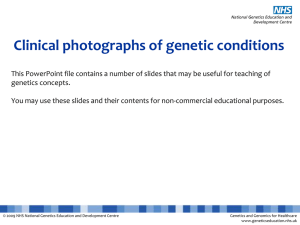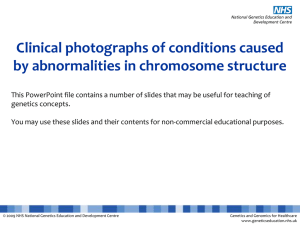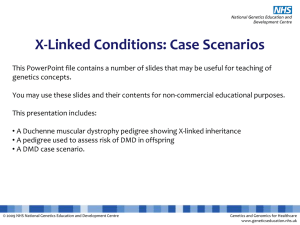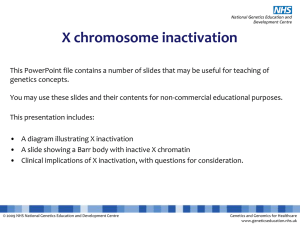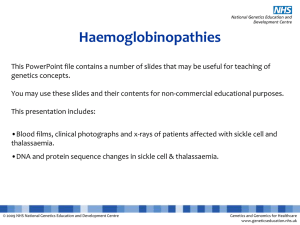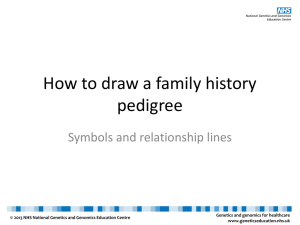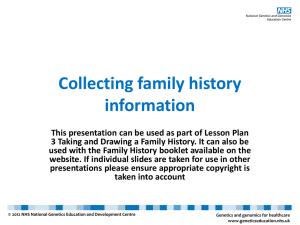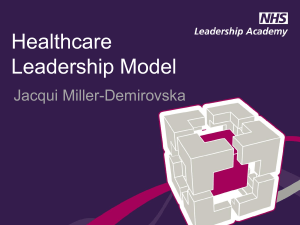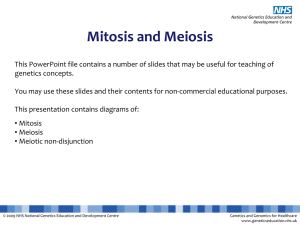Explanation slides on the role of the Clinical Genetics Service
advertisement
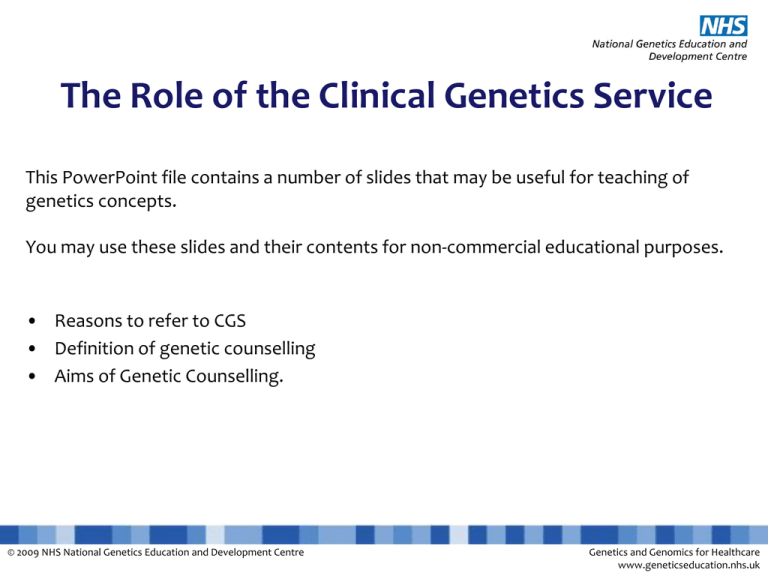
The Role of the Clinical Genetics Service This PowerPoint file contains a number of slides that may be useful for teaching of genetics concepts. You may use these slides and their contents for non-commercial educational purposes. • Reasons to refer to CGS • Definition of genetic counselling • Aims of Genetic Counselling. © 2009 NHS National Genetics Education and Development Centre Genetics and Genomics for Healthcare www.geneticseducation.nhs.uk Why are people referred? • Child: – Birth anomalies – Dysmorphic features – Learning difficulties. • Adult: – – – – – Diagnosis Predictive testing Carrier testing Family history (including cancer) Fetal loss or recurrent miscarriages. • Pregnancy: – Known genetic disorder – Abnormality detected on screening. © 2009 NHS National Genetics Education and Development Centre Genetics and Genomics for Healthcare www.geneticseducation.nhs.uk What is genetic counselling? “An education process that seeks to assist affected (and/or ‘at risk’) individuals to understand the nature of the genetic disorder, the nature of its transmission and the options open to them in management and family planning.” © 2009 NHS National Genetics Education and Development Centre Genetics and Genomics for Healthcare www.geneticseducation.nhs.uk Reasons for Clinical Genetics Referral • Affected child/adult for investigation or diagnosis • Family history of genetic disorder or condition with genetic component • Fetal loss/abnormality Information • Recurrent miscarriages • Strong family history of cancer Diagnostic Testing Predictive testing © 2009 NHS National Genetics Education and Development Centre Carrier testing Prenatal testing Genetics and Genomics for Healthcare www.geneticseducation.nhs.uk Aims of genetic counselling Give information: • What is the condition? • Inform people of the medical facts • Talk about treatment and prognosis • Explain inheritance • Discuss chance of happening again. © 2009 NHS National Genetics Education and Development Centre Genetics and Genomics for Healthcare www.geneticseducation.nhs.uk Talk about choices: • Whether to have genetic tests • Whether to have more children • Whether to have tests during pregnancy. © 2009 NHS National Genetics Education and Development Centre Genetics and Genomics for Healthcare www.geneticseducation.nhs.uk Offer support to all the family • Offer clinic appointment to other family members • Offer genetic tests to those at risk. © 2009 NHS National Genetics Education and Development Centre Genetics and Genomics for Healthcare www.geneticseducation.nhs.uk Genetic testing of Children • Beneficial if: – Confirming a suspected diagnosis – Removing need for invasive procedures. • Problematic if: – Carrier testing a healthy child – Predictive testing for adult-onset condition. © 2009 NHS National Genetics Education and Development Centre Genetics and Genomics for Healthcare www.geneticseducation.nhs.uk Making a genetic diagnosis • Family tree – to detect a pattern of inheritance • Physical examination – to give precise diagnosis • Genetic tests – Chromosomes (karyotype) – Genes (DNA testing). © 2009 NHS National Genetics Education and Development Centre Genetics and Genomics for Healthcare www.geneticseducation.nhs.uk
